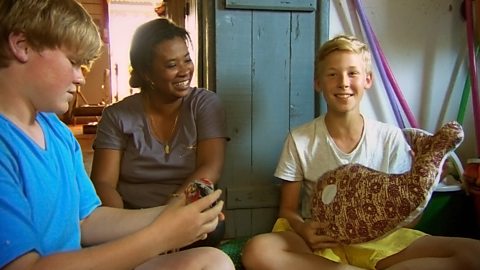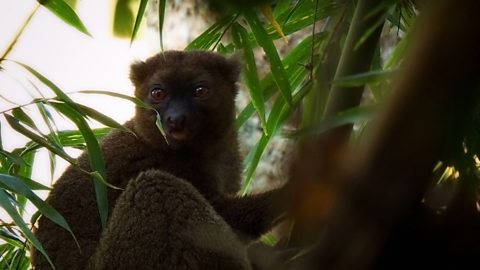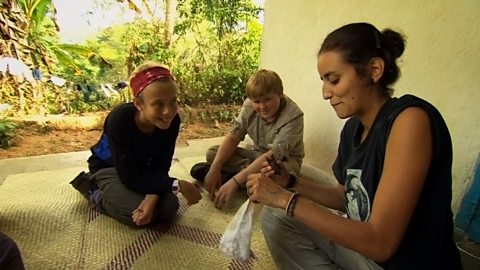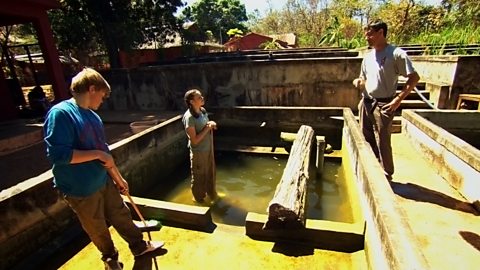Eight UK teenagers are in Madagascar to discover how fishing on a coral reef can destroy the fishes' habitat.
The video
KS3 Geography. Africa - Conservation in Madagascar.
How fishing on a coral reef is causing habitat loss
STEVE BACKSHALL: This is Madagascar. It’s a vast island in the Indian Ocean off the east coast of Africa. And it’s home to some of the most unique and rare creatures on the planet. Incredibly 80% of the wildlife here exists nowhere else on earth. But it’s a paradise under threat.
I’ve sent eight ordinary kids from the UK to discover for themselves how the people and animals can both survive here together. This was never going to be easy.
CHILD NARRATOR: Madagascar is surrounded by tropical seas, and we were going to be lucky enough to go and explore them.
CHILD: It’s like a paradise beach!
ADULT VOICE: So coral reefs are very, very important.
CHILD NARRATOR: It was seeing the coral reefs that we were most excited about.
CHILDREN: It’s going to be amazing. / Wow.
CHILD: I’m a bit nervous cos I’ve never properly done snorkelling before so…should be interesting.
CHILD NARRATOR: The purpose of our snorkelling trip was to collect data, to find out how abundant the marine life was out there. Around the world coral reefs cover less than 1% of the ocean floor. But a quarter of all species that live in the sea need them to survive.
We learned that coral is made of tiny animals, that build structures around themselves. And even though they look like bits of rock, they are actually living creatures that provide homes for tonnes more wildlife.
But we discovered that this reef wasn’t as healthy as it should have been. When we did a survey of the reef, we saw that the corals weren’t as colourful as we hoped. It looked pretty barren. Like it was dead.
CHILD: It was all sort of dull and there weren’t as many fish. They were hiding in the little sparse bits of coral that there were. And that’s really, really sad.
CHILD NARRATOR: Reefs in Madagascar are at a serious risk of losing all of their coral. Seeing this made us think we have to stop them from disappearing completely.
CHILD: You can see like all these little holes where all the little animals live.
CHILD NARRATOR: What do you think?
[QUESTION MARK]
CHILD NARRATOR: One of the things we found out in our mission was how local people live off the sea.
CHILD: [TO FISHERMAN] What type of fish?
CHILD NARRATOR: And it was the coral reefs just off the shore that was so important to them. So we went out fishing with some local women.
CHILDREN: [WADING THROUGH WATER WITH THE LOCAL WOMEN] I’m going to end up falling backwards! / Whoo! / We found a fish! / We got a fish! / I’ve seen it wriggling!
CHILD NARRATOR: And it was here we discovered one of the major reasons why the corals are dying out. The only way these women can catch fish to feed their families is to walk all over the coral reef.
CHILD: I thought it was just like sand and rock underneath. There’s loads of broken like bits of broken coral.
CHILD: I feel like by stepping on all these corals we’re sort of ruining loads of other things as well.
CHILD NARRATOR: It dawned on us what we were doing.
CHILD: Every step I take I hear ‘Kcch!’ I don’t like it. But Jamie’s loving it! She’s out there like… Look where she is! Don’t know what to do really, cos we can either save the fish or the people go hungry.
CHILD: Yeah.
CHILD: It’s a really awkward situation.
CHILD NARRATOR: We realised that we have a choice, but they don’t. The women are forced to fish near the shoreline. It’s the only practical way they can feed their families.
CHILD: They don’t know what they’re doing. I don’t think anyone’s ever explained to the women like what they should and shouldn’t be doing.
CHILD NARRATOR: As a team we were divided on our thoughts.
CHILD: We just looked down at the reefs and like what we were like stepping on and then we just felt awful.
CHILD: I’m not saying that I agree with stepping on the coral just that I wanted to help them cos, you know, they have no food. It’s a difficult situation. Everything today has been quite difficult - like contradicting. My mind is saying something different to like my heart.
CHILD NARRATOR: We saw that these women couldn’t help it. They need to feed their families, but in doing so they are destroying the coral. What would you have done in this situation?
Video summary
Download/print a transcript of the video.
The UK teenagers are introduced to a group of local women who take them on their daily fishing trip into the coral reef.
They discover the reef is dying because the only way the women can catch fish is to walk over the coral. The children consider the dilemma that the women need to fish to feed their families, but are slowly destroying the habitat of the fish they rely on.
This clip was originally from the series Deadly Dilemmas.
Teacher Notes
Download/print a copy of the Teacher Notes for this video.
Teacher Notes prepared in partnership with the Geographical Association.
Before watching the video
- Locate Madagascar using maps of the world and Africa.
- Discuss what a coral reef is. Can students name any coral reefs or describe what a coral reef looks like?
- Discuss with students what they already know about Madagascar and whether they can name other Low-Income Countries – what do those countries have in common? Discuss what percentage of Madagascar live in poverty (roughly 75.2% Worldbank data) and the impact this might have on everyday life. Show images of Madagascar to avoid a single-story narrative.
- Introduce key terms such as:
Biodiversity: the range of species living in one area.
Conservation: the practice of protecting Earth's natural resources for the benefit of current and future generations.
Coral reef: an underwater ecosystem made of tiny coral polyps. They are home to thousands of species of fish and crustaceans. - What are the benefits and challenges of conserving areas such as coral reefs? Discuss what challenges might be faced in protecting underwater ecosystems.
While watching
You may wish to stop at relevant points during this short film to pose questions and check understanding, or wait until the end. Useful questions might include:
- What are coral reefs?
- Why are coral reefs important?
- What is coral?
- Why is Madagascar at risk of losing its coral?
- Why is the coastline important to the local people?
- Why are people walking over the coral?
- Why is it difficult to balance the needs of people and the needs of the environment?What would you do?
After watching
- This clip could be used to start a discussion for and against fishing in the coral reef.
- Students could take turns to think of a situation where they have found it difficult to decide what the right thing to do was.Discuss how they resolved their situation.
- After watching the clip, students could be asked to role-play both sides of the discussion, one as a conservationist/coral reef expert and another as a local woman struggling to support her family. Encourage the other children to ask questions to help decide what they would do in that situation.
- Students also could research fishing techniques and make a presentation to show the local people how fishing techniques could change for the future.
Curriculum links
This clip will be relevant for teaching Geography at KS3 in England and Northern Ireland, 3rd/4th Level in Scotland and Progression Step 4 in Wales.
Where next?
- Research the Tuléar reef in Madagascar - the third largest coral reef in the world. Why does it need protecting? Why is the coral reef important?
- Complete a matrix for its conservation - the advantages and disadvantages of protecting the environment for the wildlife that lives there and advantages and disadvantages for the people living there.
Links
Coral reefs:
http://unitedkingdom.bahce.site/bitesize/guides/z2ntk7h/revision/4
The ocean as a resource:
http://unitedkingdom.bahce.site/bitesize/articles/z72q7yc
Benefits and challenges of conservation:
http://unitedkingdom.bahce.site/bitesize/guides/zsbn7p3/revision/6
Management of tropical coral reefs:
http://unitedkingdom.bahce.site/bitesize/guides/z2tstv4/revision/8
More from Africa - Conservation in Madagascar:
Balancing tourism and conservation in Madagascar. video
The teenagers consider the impact of tourism in Madagascar. They explore the link between the economy and conservation.

How deforestation in Madagascar is threatening animal habitats. video
The teenagers investigate how deforestation in Madagascar threatens the lemur's habitat, but happens in response to local needs.

When the need for food threatens endangered species. video
The teenagers consider what can be done to protect bats, which are often hunted as a source of meat although endangered.

Protecting endangered species in Madagascar. video
The teenagers consider two contrasting wildlife conservation projects, both working to protect endangered species.
